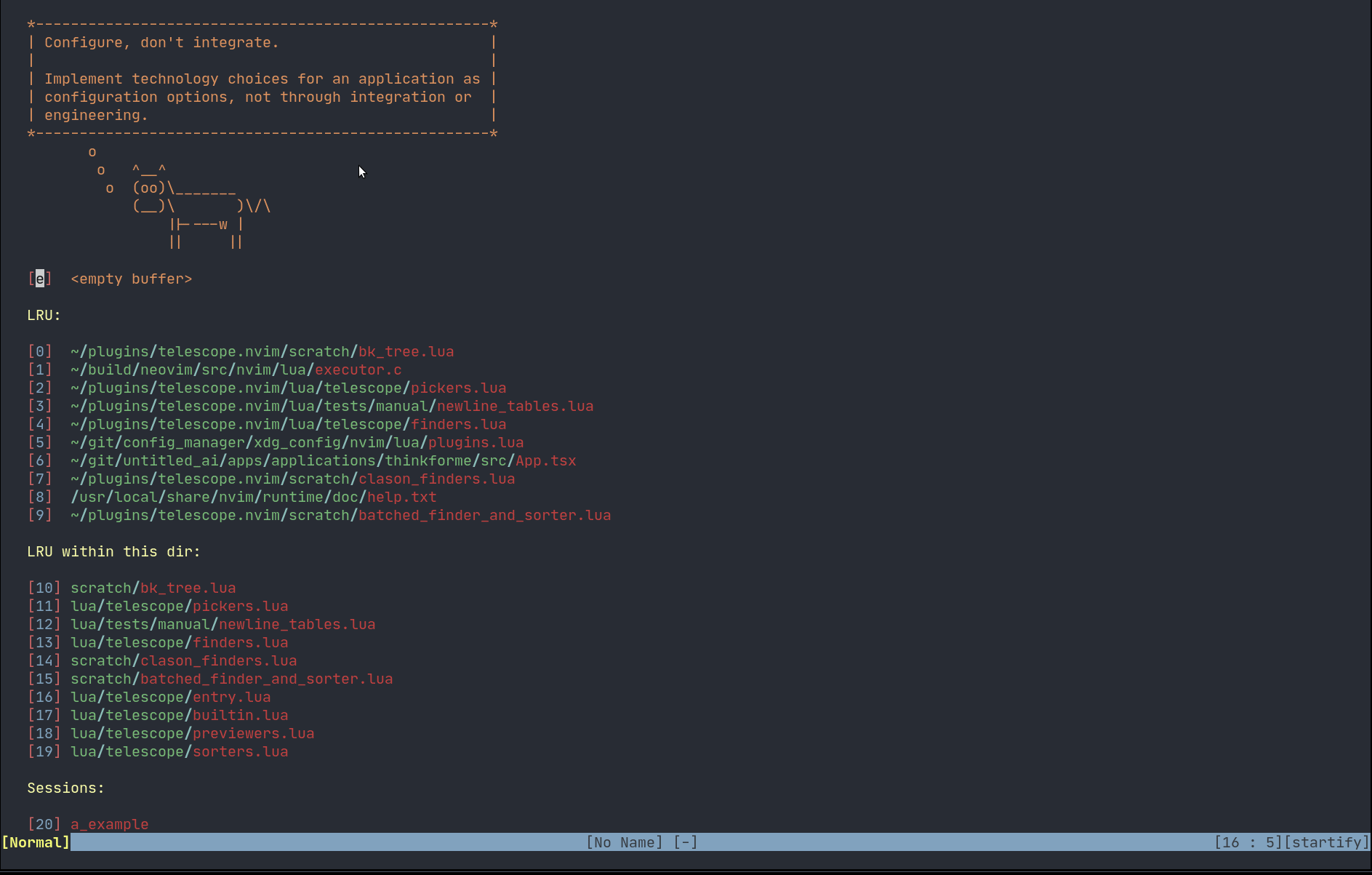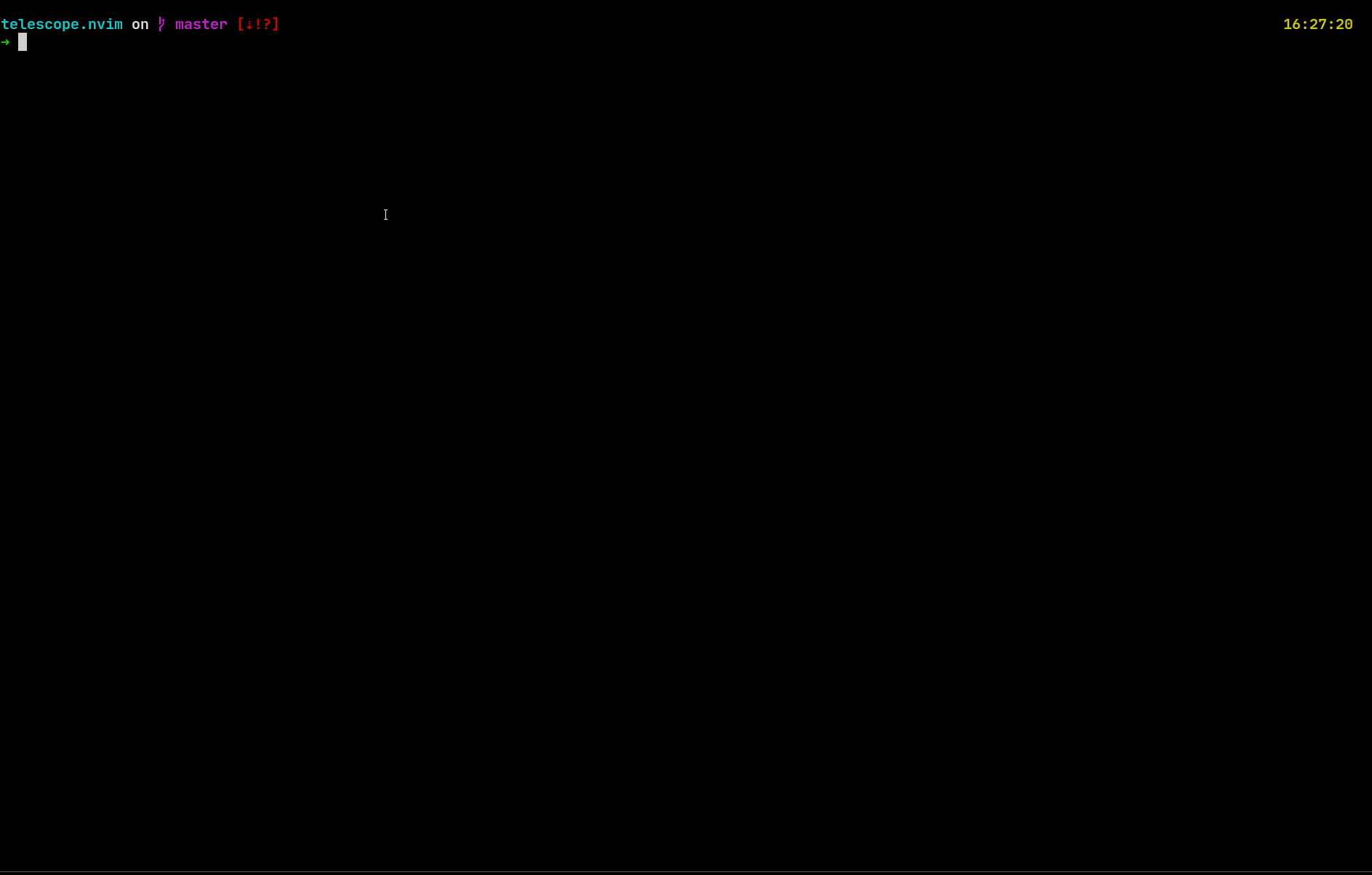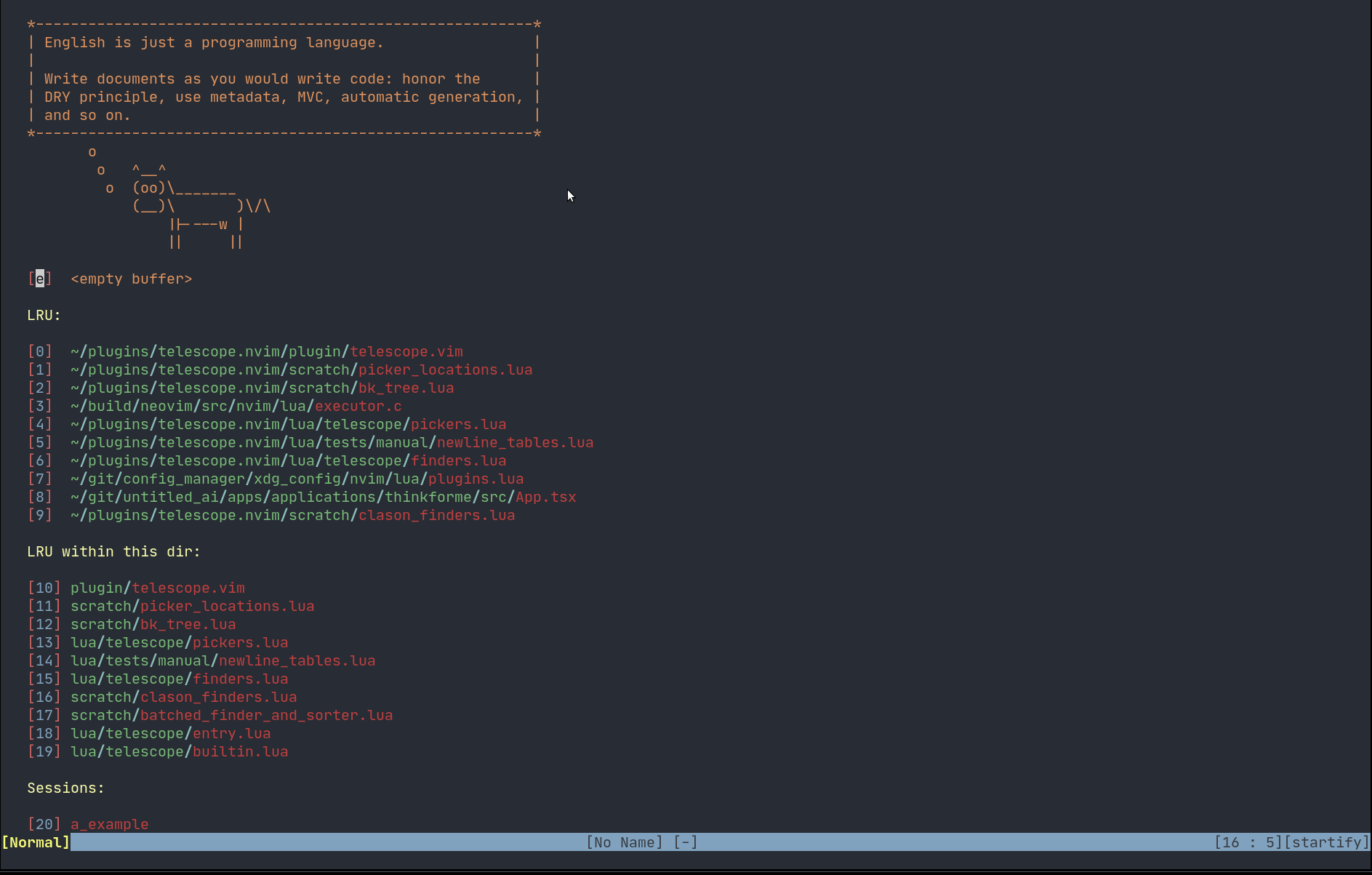Gaze deeply into unknown regions using the power of the moon.
Telescope is a highly extendable fuzzy finder over lists. Items are shown in a popup with a prompt to search over.
Support for:
- LSP (references, document symbols, workspace symbols)
- Treesitter
- Grep
- Files (git, fd, rg)
- Vim (command history, quickfix, loclist)
Neovim Nightly (0.5)
Best experience on Neovim Nightly with LSP configured.
Plug 'nvim-lua/popup.nvim'
Plug 'nvim-lua/plenary.nvim'
Plug 'nvim-lua/telescope.nvim'- bat (preview)
- ripgrep (finder)
- Treesitter (nvim-treesitter) (finder/preview)
- fd (sharkdp/fd) (finder)
- git (picker)
- neovim LSP (picker)
- devicons
Most actions are activated via keybinds. Attach these functions as described more in the Examples
-- Fuzzy find over git files in your directory
require('telescope.builtin').git_files()
-- Grep files as you type (requires rg currently)
require('telescope.builtin').live_grep()
-- Use builtin LSP to request references under cursor. Fuzzy find over results.
require('telescope.builtin').lsp_references()
-- Convert currently quickfixlist to telescope
require('telescope.builtin').quickfix()
-- Convert currently loclist to telescope
require('telescope.builtin').loclist()Options can be passed directly to the above functions, or set as defaults.
-- Optional way to setup default values
require('telescope').setup{
default = {
-- Example:
shorten_path = true -- currently the default value is true
}
}nnoremap <Leader>p <cmd>lua require'telescope.builtin'.git_files{}<CR>Searches over files in a git folder. Note: This does not work outside a git repo folder.
nnoremap <Leader>p <cmd>lua require'telescope.builtin'.find_files{}<CR>Search over files in your cwd current working directory.
nnoremap <silent> gr <cmd>lua require'telescope.builtin'.lsp_references{}<CR>Search over variable references from your Language Server.
nnoremap <Leader>en <cmd>lua require'telescope.builtin'.find_files{ cwd = "~/.config/nvim/" }<CR>Find all the files in your nvim config.
lua <<EOF
-- totally optional to use setup
require('telescope').setup{
default = {
shorten_path = false -- currently the default value is true
}
}
EOF
nnoremap <c-p> :lua require'telescope.builtin'.find_files{}<CR>
nnoremap <silent> gr <cmd>lua require'telescope.builtin'.lsp_references{ shorten_path = true }<CR>What this does:
- Make the paths full size by default. On LSP references we are shortening paths.
- Bind
<ctrl-p>for a common mapping to find files.- Using
telescope.builtin.git_filesis better in git directories. You can make a toggle to detect if it's a git directory.
- Using
- Bind
grto find references in LSP.telescope.builtin.lsp_workspace_symbolsandtelescope.builtin.lsp_document_symbolsare also good to bind for LSP.
Mappings are fully customizable. Many familiar mapping patterns are setup as defaults.
<C-n> <C-p> next | previous
<Down> <Up> next | previous
j k next | previous (in normal mode)
<CR> go to file selection
<C-x> go to file selection as a split
<C-v> go to file selection as a vertical split
<C-t> go to a file in a new tab
<C-u> scroll up in preview window
<C-d> scroll down in preview window
<C-c> close telescope
<Esc> close telescope (in normal mode)
Attaching your own mappings is possible and additional information will come soon.
Additionally, the prompt's filetype will be TelescopePrompt. You can customize the filetype as you would normally.
While the underlying API & Infrastructure (A.K.A. Spaghetti Code) is still very much WIP and
will probably change quite a bit, the functions in builtin should be relatively stable (as
in, you can report bugs if they don't work, you should be able to keep them around in your config
even if everything inside of those functions is rewritten. They provide pretty simple, easy to use
wrappers over common tasks).
require'telescope.builtin'.builtin{
-- Optional
-- hide_filename = true
-- ignore_filename = true
}Handy documentation, showcase of all tools available in Telescope.
require'telescope.builtin'.git_files{}Search your files in a git repo. Ignores files in your .gitignore. You can optionally override the find command.
Note: Requires the cwd to be a git directory.
require'telescope.builtin'.find_files{
-- Optional
-- cwd = "/home/tj/"
-- find_command = { "rg", "-i", "--hidden", "--files", "-g", "!.git" }
}Searches files in your working directory.
require'telescope.builtin'.grep_string{
-- Optional
-- search = false -- Search term or <cword>
}Searches your string with a grep.
Note: Requires rg.
require'telescope.builtin'.live_grep{}Searches all your files (respecting .gitignore) using grep.
Note: Requires rg
require'telescope.builtin'.oldfiles{}Searches the vim oldfiles. See :help v:oldfiles
require'telescope.builtin'.quickfix{}Search on the quickfix. See :help quickfix
require'telescope.builtin'.loclist{}Search on the current window's location list.
require'telescope.builtin'.command_history{}Search the vim command history.
require'telescope.builtin'.buffers{
-- Optional
-- show_all_buffers = true -- Show unloaded buffers aswell
}Search on vim buffers list.
require'telescope.builtin'.lsp_references{}Search on LSP references.
require'telescope.builtin'.lsp_document_symbols{}Search on LSP Document Symbols in the current document.
require'telescope.builtin'.lsp_workspace_symbols{}Search on all workspace symbols.
require'telescope.builtin'.treesitter{
-- Optional
-- bufnr = Buffer number
}Search on function names, variables, from Treesitter!
Note: Requires nvim-treesitter
require'telescope.builtin'.planets{}Use the telescope.
Common groups of settings can be setup to allow for themes. We have some built in themes but are looking for more cool options.
nnoremap <Leader>f :lua require'telescope.builtin'.find_files(require('telescope.themes').get_dropdown({}))<cr>Then you can put your configuration into get_dropdown({})
nnoremap <Leader>f :lua require'telescope.builtin'.find_files(require('telescope.themes').get_dropdown({ winblend = 10 }))<cr>If you wish to make theme, check out lua/telescope/themes.lua. If you need more features, make an issue :).
(Please note, this section is still in progress)
"finder":
- executable: rg, git ls-files, ...
- things in lua already
- vim things
-- lua/telescope/finders.lua
Finder:new{
entry_maker = function(line) end,
fn_command = function() { command = "", args = { "ls-files" } } end,
static = false,
maximum_results = false
}Sorter:
- A
Sorteris called by thePickeron each item returned by theFinder. Sorters return a number, which is equivalent to the "distance" between the currentpromptand theentryreturned by afinder.- Currently, it's not possible to delay calling the
Sorteruntil the end of the execution, it is called on each item as we receive them. - This was done this way so that long running / expensive searches can be instantly searchable and we don't have to wait til it completes for things to start being worked on.
- However, this prevents using some tools, like FZF easily.
- In the future, I'll probably add a mode where you can delay the sorting til the end, so you can use more traditional sorting tools.
- Currently, it's not possible to delay calling the
"picker":
- fzf
- sk
- does this always need to be fuzzy?
- you'll map what you want to do with vimscript / lua mappings
Defaults:
-- lua/telescope/pickers.lua
Picker:new{
prompt = "", -- REQUIRED
finder = FUNCTION, -- see lua/telescope/finder.lua
sorter = FUNCTION, -- see lua/telescope/sorter.lua
previewer = FUNCTION, -- see lua/telescope/previewer.lua
selection_strategy = "reset", -- follow, reset, line
border = {},
borderchars = {"─", "│", "─", "│", "┌", "┐", "┘", "└"},
preview_cutoff = 120,
}"previewer":
- sometimes built-in
- sometimes a lua callback
As an example, you could pipe your inputs into fzf, and then it can sort them for you.




